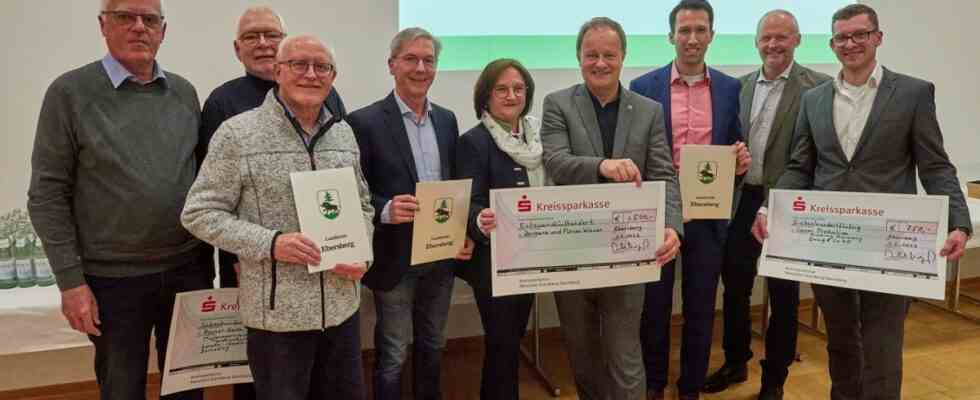You don’t just need conviction, ideas and usually some start-up capital to contribute to the energy transition. A certain bravery is often required. For example with Barbara and Florian Wieser. Their garden in Straußdorf must have been an idyll until they decided to heat their family home with geothermal energy in the future. After that it was – temporarily – a desolate crater landscape: Seven huge geothermal baskets had to be sunk in the garden, at that point it was hardly recognizable that it was a garden, says Florian Wieser.
Seven huge geothermal baskets had to be sunk in the Wiesers’ garden in Straußdorf.
(Photo: private)
In the meantime, grass has grown over the matter, and the effort has paid off for the Wieser family: they used to use 2,500 liters of heating oil a year, today they are independent of fossil fuels for heat generation, and a photovoltaic system on the roof also reduces electricity costs. For their commitment, Barbara and Florian Wieser have now been awarded the Energy Prize of the Ebersberg district. According to the jury, the project is “exemplary and close to self-sufficiency”.
This had given the Wiesers the main prize of 1500 euros, further prizes of 750 euros each went to Reiner Gerke and an Zornedinger underground car park owner association and the company Canon Production Printing Germany in Poing at the small celebration on Wednesday evening in the district office.
For their commitment, Florian and Barbara Wieser received the main prize from District Administrator Robert Niedergesäß.
(Photo: Peter Hinz-Rosin)
The Energy Prize was awarded for the twelfth time this year. Since then, a total of 171 private individuals, companies, municipalities and organizations have applied for one of the awards; this year there were eleven applications. Of course, as District Administrator Robert Niedergesäß (CSU) emphasized, the Ebersberg district alone cannot save the world – but it can still make a contribution. “Many small people, in many small places, doing many small things, can change the face of this world,” the district administrator quoted an African proverb.
Convincing garage owners – not an easy task
Niedergesäß emphasized that the consequences of climate change are not an abstract danger, they can be felt in the middle of Europe and also in the middle of Germany – as the flood disaster in the Ahr Valley in 2021 showed. Therefore, everyone is also required locally to do something about it.
How different and exciting these small and medium-sized projects can look at local level became clear when the award winners presented their projects. If, for example, there is an e-car boom in Zorneding in the future, it may well be that the project of a community of owners in the community has made a contribution. Reiner Gerke, Reinhard John and Michael Lenz managed the feat of convincing these 93 owners of an underground car park on Lorenz-Stadler-Straße to act together and equip the underground car park with charging stations.
Michael Lenz in the Zornedinger underground car park, which is now equipped with charging facilities.
(Photo: Christian Endt)
The Energy Prize has now also rewarded Michael Lenz (left), Reiner Gerke (2nd from left) and Reinhard John for their perseverance.
(Photo: Peter Hinz-Rosin)
Things didn’t look good for the plans in every phase of the project, as Reiner Gerke explained. Even before the project could be put to the vote for the first time, an opponent drew a disaster scenario with first one, then many burning electric cars, a garage on fire and finally a collapsing residential complex – “our Waterloo” Gerke calls the evening in retrospect there was no voting at all. “Then we did our homework,” said Gerke, who was comprehensively informed, asked each individual if there were still open questions and then answered them. With success: today the charging stations have long since been implemented – and many other Zornedingers ask Gerke, John and Lenz for advice and tips on how they could do the same.
The Poing-based company Canon could also be an example for many others with what it is doing for the energy transition – even Economics Minister Hubert Aiwanger (FW), who climbed onto the roof of Canon a few years ago, recognized this. There have long been large photovoltaic systems that enable the company to produce 20 percent of its own electricity. This is not only good for the energy transition, but also for the company’s finances: Because of the development in electricity prices, the systems will have paid for themselves even earlier than expected anyway, as emphasized by Stefan Speer, who is responsible for the project together with Christian Stampfer as Canon’s representative introduced.
Even Economics Minister Hubert Aiwanger stopped by Canon and praised its commitment to climate protection.
(Photo: StMWi/E. Neureuther/oh)
Now the district has also recognized the contribution to the energy transition (from left): Poing’s Mayor Thomas Stark, Christian Stampfer, District Administrator Robert Niedergesäß, Stefan Speer, Augustinus Meusel.
(Photo: Peter Hinz-Rosin)
But that’s not the only thing Canon is doing to help the climate. Succulents on the roof, a shower for those who cycle to work, charging facilities for e-bikes and e-cars, as well as nesting sites for birds, flowering meadows and bee colonies. Groundwater cooling is used for the production plant and other buildings, and the waste heat from the printers is not lost either. Many other projects are currently being planned, said Speer – that connects the large company Canon with the small single-family house of the Wiesers in Straußdorf: There, too, further steps towards the energy transition are to be taken.

